The function
int createDescendingArray(int a[])
{
int i;
printf("\nDescending array is created.\n");
for (i = value; i > 0; i--) {
a[i] = i;
}
printArray(a); // print of created array
}
is wrong.
According to the output in your question, it seems that you have defined value as 4 (you are not showing us the code with the definition). In that case, your code for the mentioned function is equivalent to the following:
int createDescendingArray(int a[])
{
printf("\nDescending array is created.\n");
a[4] = 4;
a[3] = 3;
a[2] = 2;
a[1] = 1;
printArray(a); // print of created array
}
I did nothing else to the code than unroll the loop.
Since the array a has a size of 4 elements, valid indices are from 0 to 3. Therefore, by writing to a[4], you are writing to the array out of bounds, causing undefined behavior.
If you had written
for (i = value - 1; i >= 0; i--)
instead of
for (i = value; i > 0; i--)
then the unrolled loop would be:
a[3] = 3;
a[2] = 2;
a[1] = 1;
a[0] = 0;
This is better, because now we have fixed the undefined behavior; you are no longer writing to the array out of bounds. However, this is still not what you want. If you want descending output, your unrolled loop must look like this instead:
a[0] = 3;
a[1] = 2;
a[2] = 1;
a[3] = 0;
This can be accomplished by changing your function to the following:
int createDescendingArray(int a[])
{
int i;
printf( "\nDescending array is created.\n" );
for ( i = 0; i < value; i++ ) {
a[i] = value - i - 1;
}
printArray(a); // print of created array
}
Here is a small test program:
#include <stdio.h>
//NOTE: It is customary for constants to be written upper-case,
//not lower-case, so the line below should normally not be used.
#define value 4
void printArray (int arr[]) {
int i;
printf( "\n" );
for( i = 0; i < value; i++ )
printf("%3d ", arr[i]);
}
int createDescendingArray(int a[])
{
int i;
printf( "\nDescending array is created.\n" );
for ( i = 0; i < value; i++ ) {
a[i] = value - i - 1;
}
printArray(a); // print of created array
}
int main( void )
{
int array[value];
createDescendingArray( array );
}
The output is:
Descending array is created.
3 2 1 0
In this test program, I took over most of your other code, but I did not take over the function main, because it was also causing undefined behavior:
int main(){
int arr1[value]; //create new array
arr1[value] = createDescendingArray (arr1); //fill array with descending numbers
}
In the line
arr1[value] = createDescendingArray (arr1);
you are assigning the return value of the function to a variable, although the function did not return a value. This causes undefined behavior. You may want to consider changing the return type to void in the function declaration, if it does not return a value.
Also, even if the function did return a value, arr1[value] would be writing to the array out of bounds, as valid indices are from 0 to value - 1.

